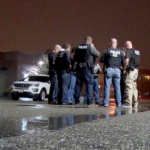
A U.S. Immigration and Customs Enforcement operation targets immigration fugitives in Los Angeles in February. Photo Credit: Michael Johnson U.S. Immigration and Customs Enforcement / The Sacramento Bee Report, 3/25/17
In a scathing editorial signed by the “editorial board,” The Sacramento Bee has very much taken issue with President Trump’s recent moves on immigration policy, especially use of federal agencies to put pressure on local law enforcement. The paper also outlined what’s at stake for the Golden State: “About 10 percent of California’s workers are undocumented, and 12.3 percent of public school children have a parent who is here illegally. It’s no wonder, then, that many California leaders are resisting Trump as best they can.
No Californian should have any interest in preventing the deportation of undocumented immigrants with felony convictions. But due process must be observed. There is the matter of the 4th Amendment, and the threat of costly lawsuits, as became apparent a few years ago.”
The editorial outlines the lawsuit: “In 2014, the Obama administration’s Department of Homeland Security ended the Secure Communities program. The Homeland Security secretary at the time, Jeh Johnson, said the program discouraged victims and witnesses from coming forward. Courts also found that aspects of it violated the Constitution.”
And it listed some penalties: “Los Angeles County, for example, paid a $255,000 settlement in a suit by a man who, as a result of the program, was held in jail for 89 days beyond his release date, and Sonoma County paid $8,000 in an unlawful detainer suit.”
Read the Bee opinion here:
Pandering is no substitute for immigration overhaul
